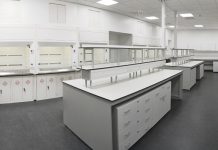The N8 group of northern universities has a new director, Dr Peter Simpson. We caught up with the former AstraZeneca department head who nurtured collaborative projects at the pharmaceutical giant to find out his plans to encourage collaboration in higher education.
Dr Peter Simpson says he is excited by “what the future could look like” in higher education. After eight years at pharmaceuticals giant AstraZeneca 2006 to 2014 where he led life sciences research departments and project teams, he joins N8 at an exciting time for the network.
N8 has delivered a number of collaborative initiatives including a £3.25m high performance computer centre and a number of collaborative research programmes. At AstraZeneca, Simpson was responsible for implementing a series of successful initiatives that brought together large pharmaceutical companies in innovative collaborations to work with SMEs and academia, so he brings a wealth of relevant experience.
Simpson also brings perspectives on the efficiency agenda from his previous role. “When I was in pharma, efficiency started off by being about cost savings, ‘how do we do more things cheaply?’.” At one point we had four screening centres in different countries and we moved down to one to save money.
“But actually we saw what we could do when these collaborations are built. Having to save money can actually drive you into partnerships that can add value. It might start off being all about saving money but it doesn’t end up there.”
Asset sharing
Simpson takes over the role of director from Sarah Jackson who in her time at N8 led a variety of initiatives including work for BIS on asset sharing in universities.
Simpson says he inherited a lot of projects that are ongoing. “I think what we are going to do is put together a portfolio of impactful collaborative projects and we will take those forward in a longitudinal approach of three to five years. We will try to do this through collaboration across the partnership and beyond.”
He continues: “We are trying to find the themes where different members of the partnership can bring different strengths. We have been working in the agri-tech field for some time for example, and you can see the complementary strengths of the research.”
One of the areas that N8 has invested a lot of energy into is developing an equipment sharing toolkit, which was launched in 2014. It was intended to make equipment sharing easier for universities.
Simpson pay tribute to the work of Sarah Jackson and Luke Georghiou on driving forward the asset sharing agenda, which he says is leading the way for the country. But he adds that further work is needed to enable more sharing and collaboration.
“I think there is a lot of willingness and enthusiasm to do it but actually sometimes the practicalities get in the way,” he says. “There are some things we are continuing to work through, for example establishing cost sharing groups between each of the members to make sure that VAT doesn’t become a major barrier for entry.
Barriers to sharing
“Working with the government and research councils, N8 has identified barriers to sharing. There are things we can do around some of the barriers like building those communities so people know each other and trust each other to use their equipment. We will push forward the toolkit and make sure people use it and will try and encourage the cost sharing group as a partial solution.”
Simpson acknowledges that it is not easy to solve all the problems and says he is hopeful that the Diamond Review (which had not been published at the time of this interview) would offer some recommendations for collaboration.”
He says that the N8’s high performance computing facility is an example of what the network can do and points to other examples of collaboration such as an equipment sharing database that makes it possible for universities to use kit that they would not be able to afford alone.
For Simpson, those collaborations must go beyond the confines of academia with businesses also able to use that equipment. “I think there are a lot of opportunities both in terms of industry sharing the kit that N8 has but also thinking about how we can tap into some of the major science hubs into the north of England.
“I spent the last nine years at the Alderley Park site of AstraZeneca, which is now being turned into a bio park and there is a lot of equipment and expertise there. We want industry to come and use our kit and also want to think about other ways of collaboratively sharing equipment. I am really interested in those partnerships across sectors.”
‘Massive change’
Having spent the past 16 years in research leadership in two international pharmaceutical companies, Simpson says he has seen “a massive change” in how that business is done over that time. After a period of growth, the past ten years have seen the closing of sites, staff cuts and the consolidation of technology.
While Simpson describes the changes and resulting job losses as “pretty painful”, he recognises that it has resulted in more effective organisations. “It is not a fun thing to go through, but it has made those companies ask difficult questions: ‘what do we really need to be successful? What can we live without having in-house?’.”
These changes forced competing pharmaceutical giants to consider working together. It also brought more collaboration with academia, something Simpson himself was involved in.
He established the Open Innovation web portal strategy for new drug targets for AstraZeneca, which has led to new partnerships with universities, translational centres and other pharmaceutical companies in nine different countries.
Deep collaboration
“That open innovation has got real traction,” he says. “Ten years ago nobody wanted to know in pharma about deep collaboration and now it is the norm.”
Other N8 work Simpson says he is excited about includes the industry innovation forums where academics and industry can build a research programme with a clear business problem to solve. He says he is keen to take this to the next level and has also joined the North East Local Economic Partnership Innovation board, to see how higher education and business can collaborate on the life sciences agenda in particular.
“We are an organisation whose role is about collaboration. If we can’t collaborate with other organisations, there is a problem,” says Simpson. “We’ve already looked at how we can interface with the LEPs going forward, the government has asked us to take part in a project called Health North and we are looking at how to take that forward.
“We are now looking beyond that to other organisations of a similar nature in the south east. N8 has good relations with organisations in Scotland. We are trying to identify what other common areas we can work together in each of those clusters. What I want us to have is more of an international agenda, building partnerships with regional consortia in the rest of Europe for example”
Simpson says he sees N8 as being a focal point for building links between higher education and other sectors. “In industry, I see one simple way in to work with eight fantastic universities. Rather than people having to negotiate separately, we will try and make it easier for them to work with universities in a more coherent manner than might be possible without us.”
Over the next few months Simpson plans to look at defining the research areas to which N8 can add the most value over the next few years. He will also be talking to potential collaborators. “Some of those won’t go anywhere but when you identify people with a like-minded view it becomes much easier,” he says.
“You need to build coalitions of the willing to drive things forward. I think it is going to be quite exciting and I am certainly excited because there are so many people we can work with. For me this is the start of the journey.”








